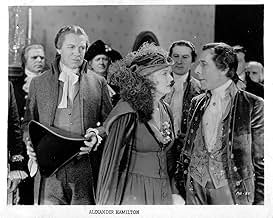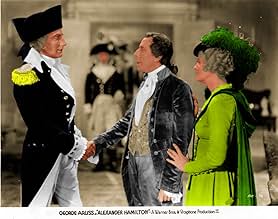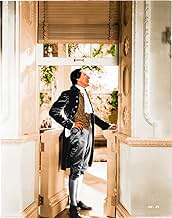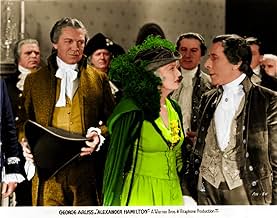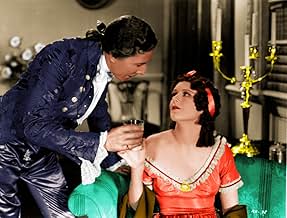अपनी भाषा में प्लॉट जोड़ेंWith the end of the Revolutionary War in 1783, General George Washington took Colonel Hamilton with him into the newly formed government. While the main disagreements in the early days was o... सभी पढ़ेंWith the end of the Revolutionary War in 1783, General George Washington took Colonel Hamilton with him into the newly formed government. While the main disagreements in the early days was over paying the soldiers who had fought in the War, Hamilton also dedicated his energies to... सभी पढ़ेंWith the end of the Revolutionary War in 1783, General George Washington took Colonel Hamilton with him into the newly formed government. While the main disagreements in the early days was over paying the soldiers who had fought in the War, Hamilton also dedicated his energies towards a national bank so that the United States would be able to trade with other countrie... सभी पढ़ें
- पुरस्कार
- कुल 3 जीत
- Second Ex-Soldier
- (बिना क्रेडिट के)
- Zack Whalen
- (बिना क्रेडिट के)
- Molly Bingham
- (बिना क्रेडिट के)
- Undetermined Role
- (बिना क्रेडिट के)
- Martha Washington
- (बिना क्रेडिट के)
- Rabble Rousing Townsman
- (बिना क्रेडिट के)
- Harvey Taylor - Ex-Soldier
- (बिना क्रेडिट के)
फ़ीचर्ड समीक्षाएं
But there is a good bit of real history in the movie that you simply don't expect. Making the Assumption Bill into something dramatic (this bill would have the federal government assume the debts of the states, especially those owed to vets of the Revolution) is a masterstroke. Who would believe that you could make drama out of the deal to trade Hamilton's desire to create a national bank, with southerners' desire to have a capital on the Potomac.
It's an intellectual drama, with a focus on Hamilton as an honorable man, and a great treasury secretary. Probably the only treasury secretary to have a movie made about him. It's so stilted, but very dramatic, and somewhat true. For comic relief, they threw in a shufflin' and jivin' black servant, so it's also funny and somewhat offensive. But it moves along, and you won't get bored. A must for history buffs.
George Arliss (1868-1946) plays Hamilton. Arliss was a major star on the stage and in the silent and the early talkie period, with films like "Disraeli" (1921 and 1929) and "Voltaire" (1933). He won the Academy Award for "Disraeli" (1929) and was nominated again for "The Green Goddess" (1930). He seems strangely cast as young Hamilton given that Arliss was in his 60s playing a man in his 30s.
Note that Arliss was so well regarded by Warner Bros. his name is even larger than the title of the film.
Alan Mowbray (1896-1969) plays George Washington. He appeared in more than 140 films from 1931 to 1962. He had a recurring role in the "Topper" series and made memorable contributions to films such as "The King and I" (1956), "The Man who Knew Too Much" (1956), "My Darling Clementine" (1946) and "Wagon Master" (1950).
Montagu Love (1877-1943) plays Thomas Jefferson. Love was a major star in the silent and early talkie period, playing in more than 100 films. He's best known for supporting roles as the Bishop in "Robin Hood" (1938), Henry VIII in "Prince and the Pauper": (1937), and Zorro in "The Mask of Zorro" (1940).
The film is directed by John Adolfi (1888-1933) a silent film director who made several films with Arliss. The film shows its stage origins.
The film centers on where to locate the capital and how to finance the new government, as well as Hamilton's indiscretion. But much of the dynamism of Hamilton's life (his active libido, his relationship with Washington, his feud with Aaron Burr) are missing.
1931 was a great year for film. The top grossing films were "Frankenstein", "Cimarron", "Mata Hari", "City Lights", and "Dracula". The Oscars went to "Cimarron" (Picture), "The Champ" (Actor), and "Min and Bill" (Actress). Other notable films released that year include "M", "Public Enemy", "Dr. Jekyl and Mr. Hyde", and "Monkey Business". Any of these films hold up much better than this one.
Of a more minor error, like the musical "Hamilton" (2020), which I watched the night before, it conflates the roles of James Madison and James Monroe, with this one favoring Monroe and the other Madison, into one character for both the Compromise of 1790 and the Reynolds scandal. Worse, this film largely portrays Monroe and Thomas Jefferson as nefarious political neophytes who, ultimately, remain honorable by promising secrecy to Hamilton's affair with Reynolds. Never mind that, really, they were the ones who spread rumors of the scandal to undermine Hamilton's political chances--all of which had nothing actually to do with the past assumption bill and more to do with the emerging party dynamics post the Washington administration. Moreover, the play invents a fictional character, a Senator Timothy Roberts, to be baddie in exposing the tabloid fodder.
Meanwhile, the married Maria Reynolds is depicted as a vamp complicit from the start in tricking and blackmailing Hamilton, which I suppose could be historically true to some extent, but it's also a dubious and convenient narrative trope. The picture doesn't dare explicitly admit Hamilton even had sex with her, while it also under-reports the sums of money extorted from the treasury secretary. I appreciate the ambiguity and economy, as to whether they copulate, of the fade to black when Hamilton walks up Reynolds's steps to retrieve his cloak, which may've seemed necessary even for a pre-code production. But, in fact, Hamilton admitted the affair, and it wasn't a one-night stand; it lasted months.
Historical inaccuracy is the least of the picture's problems, though. There's also a stereotypical black servant with all the aggravating "yessuhs" and the rest written by white men for how they think black people acted or spoke. A creaky early talkie, it's also a dully filmed play--albeit synchronized-sound technology and practices had improved somewhat in the intervening couple years between "Disraeli" and "Alexander Hamilton." There's even a non-diegetic score during one sequence, which is maudlin, but nonetheless unusual for early talkies. Of course, there's also a scene involving diegetic music, which involves Mrs. Hamilton singing and playing the piano--a common tactic of early sound films to incorporate bits of recorded music.
Anyways, having now seen three Arliss vehicles, I'm suspecting that he had a hand in selecting his co-stars based on them being so lousy as to not upstage him. Besides the performances for the aforementioned side characters, Doris Kenyon is particularly atrocious as a withering-flower sort of depiction of a wife. It's nauseating. Too bad, too, because I still have fond memories of her from the days before Hollywood, in Fort Lee, New Jersey, when she played ingénue in the meta-film "A Girl's Folly" (1917). Consequently, Arliss has an admittedly commanding screen presence, I suppose, but caricaturizations of these historical fuddy-duddys tends to be a bore and far less interesting than the historical figures appear to have been in better-composed historical records.
Let it be stated immediately that George Arliss should have been the worst possible actor to portray the title figure in this film. First, he was much too old (Hamilton was in his 30's at the time of the scandal; Arliss turned 63 in 1931). Also, the handsome Hamilton in no way resembled Arliss, who, quite frankly, looks like a death's-head.
But this is not supposed to be a physical reconstruction of the historical Hamilton, but rather a look into the heart & character of the fellow. In this, Arliss succeeds admirably, using his tremendous acting talents to both inform & entertain us. Truly, he was one of the great cinematic artists of his generation and it is a shame that he is all but forgotten today.
Although all centers around Arliss, the rest of the cast does well: Doris Kenyon & June Collyer as the very different women in Hamilton's life; Dudley Digges & Ralf Harolde as his enemies; Montague Love as Thomas Jefferson; and old Lionel Belmore, stealing a few scenes as Hamilton's corpulent father-in-law. Special mention should be made of Alan Mowbray, very effective as George Washington.
Non-political potential viewers who avoid this film risk missing a superb performance by one of the past masters.
One of the worst, maybe the worst of the ones he did was Alexander Hamilton. In this film we have the 63 year old Arliss playing the 30 something Hamilton in a play where his financial assumption plan and the eventual selection of a southern capital got interposed with America's first sex scandal, Hamilton's affair with Maria Reynolds.
Historians will be aghast at this screenplay, but even more aghast at the casting of Arliss as Hamilton, next to younger actors like Montagu Love as Thomas Jefferson and an even younger Alan Mowbray as George Washington.
After a brief prologue with Washington and Hamilton at the end of the Revolutionary War, where Hamilton expounds on his nationalist views, the action fast forwards to the early 1790s and the first Washington term as president. Arliss is trying to push his financial plan for the federal government to assume all state debts to put the new United States of America on a sound financial basis. Love and his supporters which include a completely fictional character, a Senator Timothy Roberts played by Duddley Digges, see the idea as a power grab. They want the capital relocated to somewhere in the southern states.
Digges wants more than that. He offers to swing votes Hamilton's way in order to get a plum ambassadorship to gay Paree, in the midst of its own revolutionary problems. Arliss is mortified by the offer and flat turns him down. Digges vows revenge.
The revenge comes in petticoats in the person of June Collyer as Maria Reynolds. Her husband, encourages the affair with Hamilton and then seeks to blackmail him. Of course Hamilton is vulnerable in this way because his dear wife Elizabeth has had to visit her sister Angelica in Paris. Elizabeth is played by Daisy Kenyon.
The only thing this travesty got right was Elizabeth Schuyler Hamilton's total devotion to her man. Hamilton however never missed an opportunity for a long affair or quick roll in the hay in his life. Including that unseen sister Angelica who also at a different time was involved with Thomas Jefferson.
The worst thing about Alexander Hamilton however was the casting. Arliss was a co-author of the play this movie is based on and I'll bet it was a role he did on stage many times. The key here is that Hamilton had an active libido, but it was a young man's libido and that Washington was a father figure for him. Hamilton was of illegitimate birth and rose from poverty, a fact he never forgot. The last thing he was would have been a lonely guy pining for his wife who was away over the seas.
Hamilton was at times, brilliant, loyal, arrogant all in the same person. Not the wizened old fox we see. In real life Hamilton was 49 when he died years later in that duel with Aaron Burr. His assumption plan and the deal for the capital was struck much before the Reynolds affair.
A great deal is made of Hamilton's honesty and in financial matters he was scrupulously honest. In real life his choice of subordinates was not always the best. His first Under Secretary of the Treasury had to resign because he was caught speculating in those bond obligations Hamilton wanted the federal government to assume. It was the first insider trading scandal in American history. Hamilton took quite a few hits from that one also from Jefferson, etc.
A cast of classically trained players do a decent job in bringing this historical travesty to the screen. Make no mistake, you are NOT seeing anything resembling the real Alexander Hamilton though.
क्या आपको पता है
- ट्रिवियाThe play, "Hamilton," opened on Broadway in New York City, New York, USA on 17 September 1917, closing in November 1917 after 80 performances. The opening night cast included George Arliss, who originated his movie role as Alexander Hamilton, Florence Arliss (Arliss' real life wife) as Betsy Hamilton, and Jeanne Eagels as Mrs. Reynolds.
- गूफ़No amount of makeup could disguise the fact that George Arliss (who was over 60 years old at the time this film was made) was far too old to portray the then 30 to 40 year old Alexander Hamilton shown in the time frame of the film.
- भाव
General Philip Schuyler: [after watching him persuade two rivals to vote for his bill] Alexander, you're a wizard.
Alexander Hamilton: No, General. But I'm learning to be a politician.
- साउंडट्रैकYankee Doodle
(ca. 1755) (uncredited)
Traditional music of English origin
Played by marching soldiers during the opening credits and at the end
टॉप पसंद
विवरण
बॉक्स ऑफ़िस
- US और कनाडा में सकल
- $9,87,540
- दुनिया भर में सकल
- $12,77,480
- चलने की अवधि1 घंटा 10 मिनट
- रंग
- ध्वनि मिश्रण
इस पेज में योगदान दें


